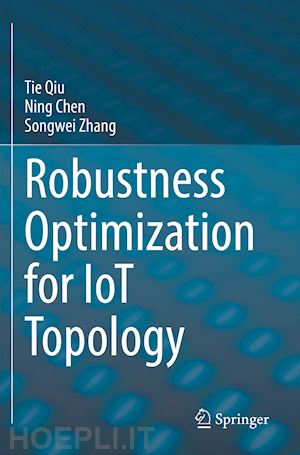
Questo prodotto usufruisce delle SPEDIZIONI GRATIS
selezionando l'opzione Corriere Veloce in fase di ordine.
Pagabile anche con Carta della cultura giovani e del merito, 18App Bonus Cultura e Carta del Docente
The IoT topology defines the way various components communicate with each other within a network. Topologies can vary greatly in terms of security, power consumption, cost, and complexity. Optimizing the IoT topology for different applications and requirements can help to boost the network’s performance and save costs. More importantly, optimizing the topology robustness can ensure security and prevent network failure at the foundation level. In this context, this book examines the optimization schemes for topology robustness in the IoT, helping readers to construct a robustness optimization framework, from self-organizing to intelligent networking.
The book provides the relevant theoretical framework and the latest empirical research on robustness optimization of IoT topology. Starting with the self-organization of networks, it gradually moves to genetic evolution. It also discusses the application of neural networks and reinforcement learning to endow the node with self-learning ability to allow intelligent networking.
This book is intended for students, practitioners, industry professionals, and researchers who are eager to comprehend the vulnerabilities of IoT topology. It helps them to master the research framework for IoT topology robustness optimization and to build more efficient and reliable IoT topologies in their industry.
1.1 Context and motivation
1.2 Characteristics of IoT topology
1.3 Attack modes against network topology
1.4 Book organization
Chapter 2 Preliminaries of robustness optimization
2.1 Metrics of topology robustness
2.2 Related work
2.3 Existing challanges
Chapter 3 Robustness optimization based on self-organization3.1 Path planning based on the greedy principle
3.2 Construction of highly robust topology
3.3 Robust time synchronization scheme
Chapter 4 Evolution-based robustness optimization4.1 Robustness optimization scheme with multi-population co-evolution
4.2 An adaptive robustness evolution algorithm with self-competition
Chapter 5 Robustness optimization based on swarm intelligence
5.1 Topology optimization strategy with ant colony algorithm
5.2 Topology optimization strategy with particle swarm algorithm
Chapter 6 Robustness optimization based on multi-objective cooperation
6.1 Multi-objective optimization based on layered-cooperation
Chapter 7 Robustness optimization based on self-learning
7.1 Malicious node identification scheme based on gaussian mixture model
7.2 Highly robust topology learning model based on neural network
7.3 Highly robust topology generation strategy based on time series convolutional network
Chapter 8 Robustness optimization based on node self-learning
8.1 Node self-learning mechanism based on reinforcement learning
Chapter 9 Future research directions
9.1 Homogeneous networks
9.2 Heterogeneous networks
9.3 Smart IoT
Dr. Tie Qiu is currently a full professor in the School of Computer Science and Technology at Tianjin University, China. Prior to this, he was an assistant professor and associate professor in the School of Software at Dalian University of Technology. He was a visiting professor in the Department of Electrical and Computer Engineering at Iowa State University in the USA (2014–2015). He serves as an associate editor of IEEE Transactions on Network Science and Engineering (TNSE) and IEEE Transactions on Systems, Man, and Cybernetics: Systems; area editor of Ad Hoc Networks (Elsevier); associate editor of Computers and Electrical Engineering (Elsevier) and Human-centric Computing and Information Sciences (Springer); and guest editor of Future Generation Computer Systems. He serves as general chair, program chair, workshop chair, publicity chair, publication chair, and TPC member of a number of international conferences. He has authored/co-authored 9 books and over 150 scientific papers in international journals and conference proceedings, such as IEEE/ACM Transactions on Networking, IEEE Transactions on Mobile Computing, IEEE Transactions on Knowledge and Data Engineering, IEEE Transactions on Industrial Informatics, IEEE Communications Surveys & Tutorials, IEEE Communications, INFOCOM, and GLOBECOM. His 10 papers are listed as ESI highly cited papers. He has contributed to the development of 4 copyrighted software systems and holds 16 patents. He is a distinguished member of the China Computer Federation (CCF) and a senior member of IEEE and ACM.
Ning Chen is a PhD candidate at Tianjin University. His research focuses on the Internet of Things, including robustness optimization, wireless sensor networks, artificial intelligence, big data analysis, smart city, and Internet of Vehicles. He has published more than 10 papers in leading journals, including two ESI highly cited papers.
Mr. Songwei Zhang is currently a technical engineer at Tianjin University. He has extensive experience in the robustness optimization of Internet of Things topology.











Il sito utilizza cookie ed altri strumenti di tracciamento che raccolgono informazioni dal dispositivo dell’utente. Oltre ai cookie tecnici ed analitici aggregati, strettamente necessari per il funzionamento di questo sito web, previo consenso dell’utente possono essere installati cookie di profilazione e marketing e cookie dei social media. Cliccando su “Accetto tutti i cookie” saranno attivate tutte le categorie di cookie. Per accettare solo deterninate categorie di cookie, cliccare invece su “Impostazioni cookie”. Chiudendo il banner o continuando a navigare saranno installati solo cookie tecnici. Per maggiori dettagli, consultare la Cookie Policy.